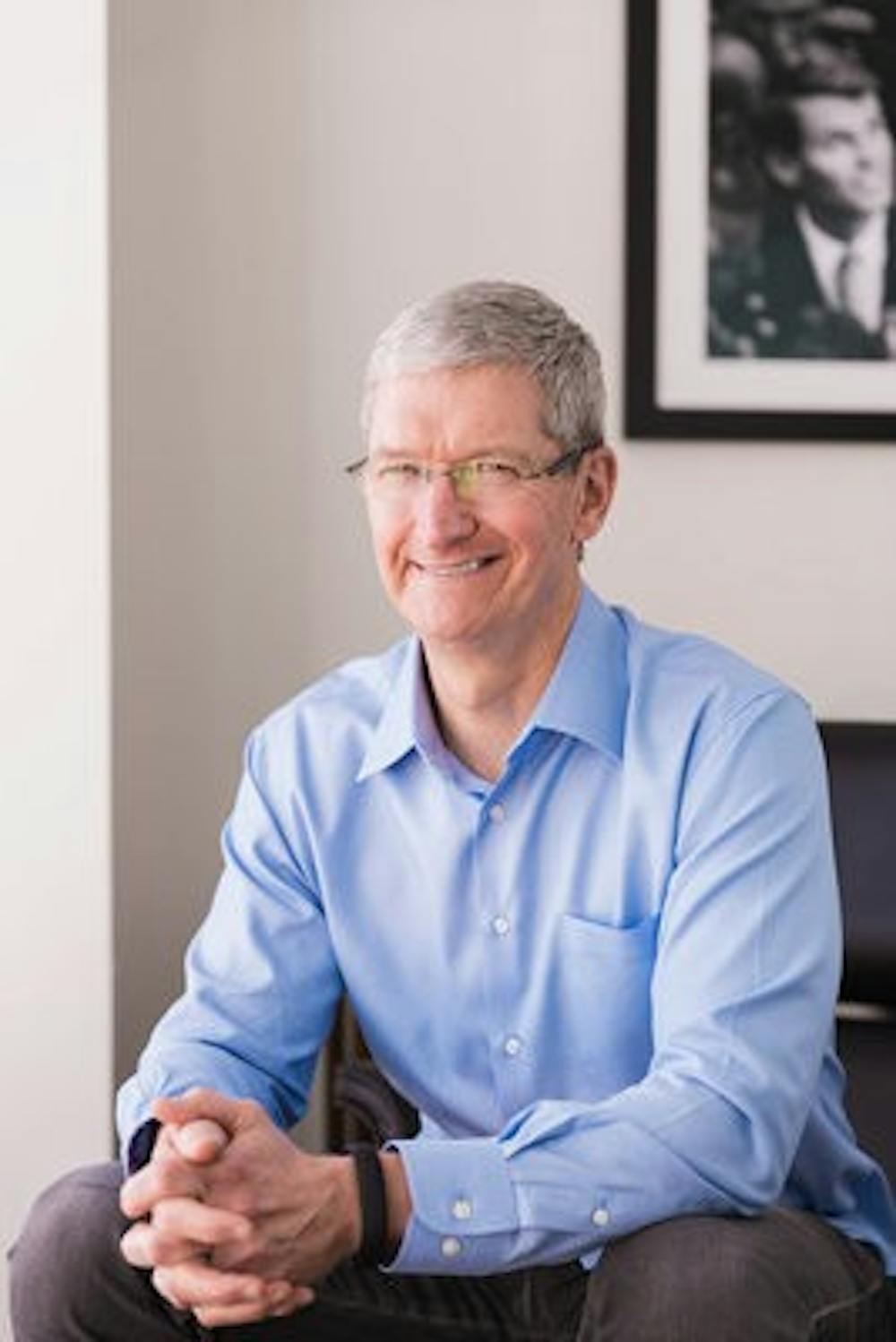Tim Cook enters a dimly lit private room in The Hotel at Auburn University and Dixon Conference Center. The room is part of the hotel's restaurant, outfitted with two long dining tables with placemats set at each spot. He pauses in the doorway and says, "Let's go get some coffee."
His transitions lenses change from clear spectacles to a pair of shades as he strolls down College Street the Saturday before spring break.
The Apple CEO and 1982 Auburn graduate is on an abbreviated visit to receive the Lifetime Achievement Award from the Alumni Association. He's already made use of his time, commenting on how still campus was the night before and how impressed he is with the new Recreation and Wellness Center.
Once he arrives at the Wake Up Coffee Company, Cook settles into a leather chair. Sitting cross-legged in faded blue jeans, Cook appears at ease in the town of his alma mater.
"I get flooded with memories when I come back [to Auburn]," Cook said. "It always gets overwhelming."
He sips on a black hand-brewed coffee from Bali and continues speaking at a metered pace about his time during undergrad.
"I played intramural softball. I was on a great team. We won very few games, but it was a lot of fun."
He recalls working on UPC, selecting entertainment and showing movies at Langdon Hall, which he glances at through the coffee shop window.
But the mark Cook left on the University extends beyond extracurricular activities or receiving a diploma in cap and gown.
Seventeen years after his graduation, Cook's field of study, industrial engineering, faced the possibility of being shut down.
At the same time, Dr. Alice Smith arrived as the program's new department head. One of the first moves she made to revitalize the program was to form an alumni advisory board. The initial group that served on the board chose Cook as its chair.
Cook acknowledged his duty as the board's chair was simply to advise. He likened it sitting shotgun, or sometimes in the backseat, but never driving.
Riding as a passenger didn't stop his vision for the destination.
"He wanted to provide students with not only excellent technical education, but also with being well rounded, and with a lot of what he would call 'high touch' (education). This means that [students] have a lot of personal interaction with faculty, with staff and with each other," Smith said. "It's a very conducive environment, not just to help with book learning, but really learning to stretch as a human being and as a future professional."
Cook envisioned a collaborative learning environment for the industrial engineering program, blurring the lines between teacher and student. The goal was not to have the highest enrollment, but a hands-on learning experience that produced well-rounded students.
"The best places where people learn, you can't tell the difference between teacher and student," Cook said. "The truth is, we all learn from each other and we teach each other. I don't think the schools that focus on having the most students can do that very well."
The decision to pursue holistic learning wasn't based solely on educational tactic. The community also played a key role.
"Auburn is about family and community, (it's) very high touch," Cook said. "And so, to me, bringing that back, bringing that human feeling back, was key in getting the program back on track. It's something I always wanted for the school."
Fifteen years after the program scare, the industrial engineering program is thriving. Cook has contributed to its status by funding a professorship attracting prestigious faculty, as well as two student scholarships.
Cook was a typical Auburn student. He lived on Gay Street. He spent too much time at a shop that used to serve homemade ice cream. He and a group of buddies even broke into Samford Hall one night, climbed to the clock tower, and tried to change the music it played.
"We thought we were [successful] because we put a tape cassette in. We were waiting for it to play but then the hour comes, and it chimes. So, we failed miserably," Cook said, laughing. "Somehow, at the time, it seemed like a good idea."
He's come a long way - from swapping cassette tapes in Samford Hall to playing a part in the digital music revolution. But for Cook, life isn't about the destination.
"The journey is the reward," he said. "You should live every day like it's your last one. If you're always waiting for something to occur, some destination to get somewhere, if you're always saying, 'I'll do that when I graduate, or I'll do that when I get a job, or I'll do that when I'm married, or I'll do that when I get the promotion...' I see people putting off their life so much, waiting for something to occur, and it invariably just moves.
"The graduation becomes the job, the job becomes the promotion, the promotion becomes the next promotion, and so I think people that get caught up in that are postponing their life. I credit Steve (Jobs) a lot in getting me to look at that very differently. His dream was always in his journey."
For many, Auburn becomes a destination, a check off life's to-do list. For Cook, it remains with him as part of the journey.
"When you come here, you think of Auburn as a place, as a location," Cook said. "You might think of it as a football team, but somewhere along the line I think for many people, it certainly clicked for me, you realize Auburn is not a location at all.
"It's not a place. It's a spirit that you take with you for the rest of your life. That's the magic of the place. Said in a simple way, that is the magic of the place."
Do you like this story? The Plainsman doesn't accept money from tuition or student fees, and we don't charge a subscription fee. But you can donate to support The Plainsman.





